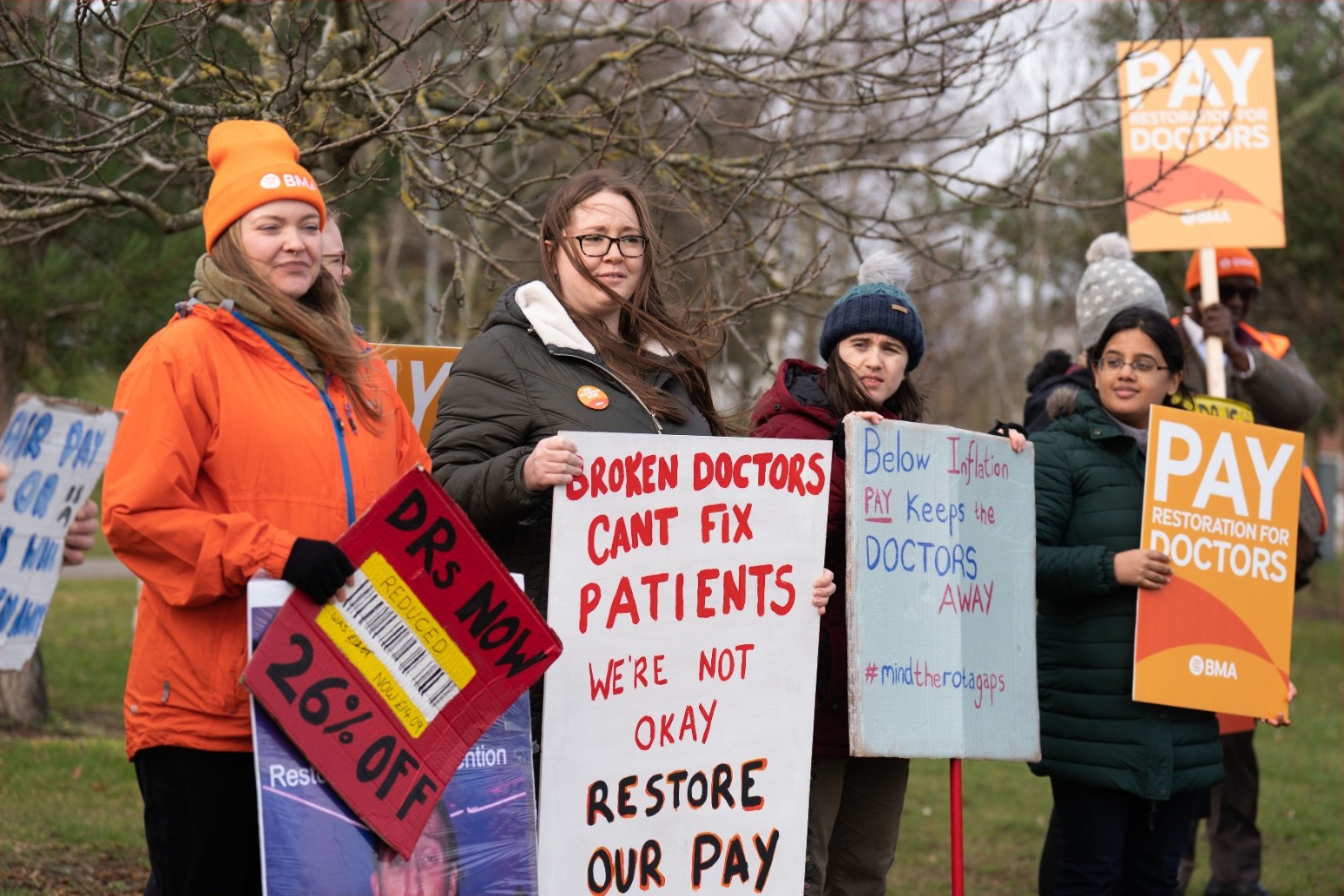
They’ve begun a 72-hour walkout which will see appointments and operations cancelled for thousands of patients
Tens of thousands of junior doctors have gone on strike across England, with the NHS bracing itself for three days of mass disruption.
The 72-hour walkout, which began on Monday morning, will see operations and appointments cancelled for thousands of patients as doctors join picket lines outside their hospitals.
More than 100,000 appointments have already been postponed this winter after nurses took strike action in a dispute with the Government over pay, according to NHS figures.
The British Medical Association (BMA) is demanding a substantial pay rise for doctors, with its latest campaign saying junior medics could earn more per hour if they worked in Pret A Manger.
The BMA says junior doctors’ pay has fallen in real terms by 26% since 2008/09 and reversing this would require a 35.3% pay rise.
On Friday, Health Secretary Steve Barclay invited the BMA to talks but the union rejected the idea, saying there were “unacceptable” preconditions.
The preconditions are understood to have included looking at a non-consolidated lump sum payment for last year, whereas the BMA is seeking what it calls “full pay restoration”.
Junior doctors make up around 45% of the NHS’s medical workforce and consultants and other medics have been drafted in to provide strike cover in areas such as A&E.
Professor Stephen Powis, medical director of NHS England, told Times Radio the health service will see “extensive disruption” over the next three days.
He said: “This is likely to be the most disruptive set of industrial action days that we’ve seen all winter.
“Why is that? Well, it’s three days rather than just one day, it involves junior doctors that are a large part of the medical workforce and, of course, work in many healthcare settings, not just hospitals – general practice, mental health trusts and, of course, community settings too – and so it’s likely that we will see that extensive disruption.
“We’ve been focusing on ensuring that emergency care, A&E departments, critical care, maternity services are maintained, but that’s going to come, unfortunately, at the expense of other services, such as routine appointments and some surgery.”
Prof Powis said cancer care is likely to affected by the strikes, saying the NHS is doing “everything we can to ensure that urgent cancer procedures go ahead but, unfortunately, even some of those may be affected this week, such is the extent of the disruption that we’re likely to see”.
“If that does occur, we will reschedule people as quickly as possible,” he added.
Earlier, the NHS chief told BBC Radio 4’s Today programme the strikes are “likely to be the most severe of all those (strike) days this winter, perhaps even the most severe disruption that we’ve seen of any strike in the NHS during its history”.
Nick Hulme, chief executive of East Suffolk and North Essex NHS Foundation Trust, which runs Ipswich and Colchester hospitals, told the Today programme the trust has been looking at patient lists to ensure “those who will suffer significantly clinically, if they’re not operated on in the next three days, they will come in and get their operations”.
He added: “But for the overwhelming majority of our patients and operations, sadly we will have to postpone those so that we can reallocate our consultant body mainly to the front door – to the urgent emergency care 24/7 services.”
Elsewhere, Sir Julian Hartley, chief executive NHS Providers, urged the Government and BMA to start negotiations to find a resolution to the dispute.
He said staff have faced enormous challenges in recent years and “pay has not kept up with inflation and the cost of living and we want to make sure that NHS staff are appropriately rewarded and remunerated given the incredible jobs that they all do”.
Meanwhile, Professor Philip Banfield, the BMA’s chairman of council, told BBC Radio 4’s Today programme the NHS could be “safer than normal” for patients as junior doctors strike.
He said the danger faced by patients would be the “same danger that occurs every day”, adding: “It’s a scandal that three to five-hundred patients are dying each week in the current health service because of the chronic underfunding.”
He later told the PA news agency from a picket line outside the Queen Elizabeth Hospital in Birmingham: “We have the worst crisis in the NHS that I have ever known and it’s seeing junior doctors leave in their droves.
“The junior doctors’ strike is so sad to see but they feel they have been driven to this.”
Elsewhere, Dr Robert Laurenson, co-chairman of the BMA junior doctors committee, told Sky News the BMA wrote to Mr Barclay in August but did not meet until March.
He said that, on March 2, “he told us he didn’t have a mandate and had to go back to the Prime Minister”.
Dr Laurenson said Mr Barclay “sent me an email at 9.49pm (on Friday night) asking us to talk when we’d had a meeting with his civil servants earlier that day, which he didn’t turn up to.
“We’ve gone to many meetings and he’s only turned up to one. So for him to come out and say that we’re not coming to the table is, frankly, disingenuous.”
Dr Vivek Trivedi, co-chairman of the BMA’s junior doctors committee, told ITV’s Good Morning Britain the strikes are going ahead because junior doctors have faced more than a 26% real-terms pay cut over the last 15 years.
He said: “We’ve let the Government know about this for months, if not years, and we’ve been in a formal dispute with the Government for over 150 days since October. And it’s been disappointing that we’ve had radio silence from them this whole time.”
In its new campaign, the BMA says junior doctors can make more serving coffee than saving patients.
It said: “That is the message the Government is sending junior doctors by refusing to value them properly and address more than decade of real-terms pay cuts that mean newly-qualified medics earn just £14.09 an hour.
“This is in comparison to baristas at Pret a Manger, who can earn up to £14.10 an hour, after the coffee chain recently announced it has raised wages by 19% this year.”
A Department of Health and Social Care spokesman said the comparison is “misleading” as it does not take into account the additional earning capacity and pay progression available to junior doctors.
Prime Minister Rishi Sunak told reporters on his flight to the US on Sunday it is “very disappointing that the junior doctors’ union are not engaging with the Government”.
It comes as members of several trade unions will strike on Budget day on Wednesday in what will be one of the biggest single days of industrial action for years.
Published: by Radio NewsHub







